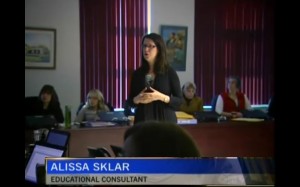 You know that moment when our children pour out of school at pickup looking for their parents? How they scan the crowd to make eye contact with the mom or dad who actually made the trip to school to collect them? According to MIT Professor Sherry Turkle, today’s children are just as accustomed to seeing the top of their parents’ heads, staring down at their Blackberries or iPhones. We are there waiting for them, but our minds are somewhere else.
You know that moment when our children pour out of school at pickup looking for their parents? How they scan the crowd to make eye contact with the mom or dad who actually made the trip to school to collect them? According to MIT Professor Sherry Turkle, today’s children are just as accustomed to seeing the top of their parents’ heads, staring down at their Blackberries or iPhones. We are there waiting for them, but our minds are somewhere else.
Does that sound familiar?
Are you ever the parent in the park scrolling through your email while your kids build sand castles or play on the swings? The one who sneaks in a quick text message driving your kids to work, telling yourself it’s OK because you are stopped at a red light? Have you ever stolen a glance at the screen of your smartphone during the children’s school play or piano recital, because you saw the blinking red light?
C’mon. Tell the truth. At least to yourself. We’ve all been that parent.
Case in point: a few weeks ago, I surprised my three daughters with two days at Disney World and Universal Studios in Orlando. To avoid roaming charges, I had shut off my Blackberry, and our day together roaming the Harry Potter castle was all about old-fashioned face-to-face togetherness. But when we got to Disney, I paid $10 for a day of data so I could use an app designed to let you know the waiting times for each of the rides. Cool idea. But having my phone wired again meant I could also text friends, check my email and upload pictures to Facebook of us having fun. I tried to control this need to keep checking (after all, I was with my children in the Happiest Place on Earth!) but I succumbed several times. Finally one of my 12-year-olds fixed me with a withering glance and said “Mom, that is so rude. Who do you need to talk to? We are right here.”
Wise words from one so young. She was right. I shut the phone off. (Also my battery died. Damn Blackberry Bold.)
The truth is, those smartphones have radically changed our expectations and experiences of communication, according to Turkle, author of The Second Self. In her newly released TEDx Talks video “Alone Together,” the director of the MIT Initiative on Technology and the Self describes the way this new form of communication has dramatically rewired the ways we connect to others. Not just in practical, technological terms, but in the deeper sense of changing intimacies and rewired human relationships.
“We are very vulnerable,” she says. “We are lonely but fearful of intimacy. Connectivity offers for many of us the illusion of companionship without the demands of friendship.”
Wow. That hit home for me. It made me think of the glib status updates and tweets we are so tempted to send off without thinking. Sure it’s nice to connect with old friends and family online but how real is that? How dependable, when the time comes to really need actual people in our lives?
She explains that there is something innate in the human experience that leads us to text rather than talk. That connecting online lets us control the demands real connection would place upon us. We are too busy communicating to truly connect.
Turkle reminds us that those kids coming through the schoolyard are being trained by their parents’ smartphone use. They are learning that technology is the competition for their time together. Ironically, instead of despising the little portable computers in our purses and jacket pockets because they take us away from them, they cannot wait to get their hands on their own.
And when they do, they will begin to ignore us. We will have to text them to come downstairs for dinner. Accept their text-speak rendition of how their history exam went (it was gr8!) or how they are feeling when their girlfriend dumps them (sad emoticon). Or worse, we will suffer their half-attention to our conversations as they scroll across the screens in their hands.
Just as we have done to them.
Turns out it’s possible to feel lonely with your loved ones in the same room, if they have smartphones in their hands.
Turkle begs us to reconsider some conversations we’d shut down in our almost unthinking acceptance of these marvelous gadgets. She worries about the way we curate our online personas to only share what is easy to share. When we cut off conversations in our personal lives and professionally to omit the real problems and stumbling blocks of our daily lives, we make connections harder and less meaningful. She calls this “reclaiming conversation” and challenges us to consider the ways we can be more honest with each other in our status updates and text messages.
What do you think about the way our technology use has changed our ability to connect with our families? Have you ever experienced being “along together”? Do you see technology as competition for real time to connect with our kids?



